Happy holidays, internet, all snug in your cyberbed, as visions of new memes dance in your head.
Here's wishing everyone a happy holiday or holidays of their choice.
Tuesday, December 23, 2008
Friday, December 19, 2008
15 Degrees of Deconstruction
Homesickness is nothing new to me. And hardly something unique. I miss where I grew up. The time, as much as the place. I could go on about all the sentimentality, but in pining over old time, I was fooling about in Google Maps. I'm not sure what really motivated me to do this, but I started from a wide angle view of the East Coast, and took one screenshot at each subsequent increase in magnification until I was home. Virtually going home....deconstructing the distance into mentally manageable chunks..or just a lifelong fetish for maps and places and place names...I don't know. But here is the result. (with the warning that this will be alterantely pretentious, obtuse, sentimental, dull, and overly long. but then, you're reading my blog, so...)
Iteration 1: The East Coast - New York, without borders, is the gateway, in more than just a geographical sense, between New England and the rest of the country.
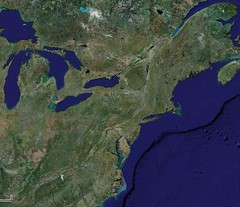
Iteration 2: New York and southern Canada- The Finger Lakes and the Adirondacks are clearly visible, taking up huge swaths of the state
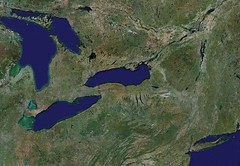
Iteration 3: Upstate NY - the vast amount of the state that is not in the City, to the continual suprise of the rest of the country. Cities become visible against a background of green and tan agriculture
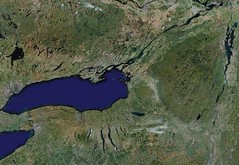
Iteration 4: Northern New York - bordered by Onondaga to the west, the great St. Lawrence River plain to the north, and the Adirondacks to the east, home was compromise between the extremes around it.
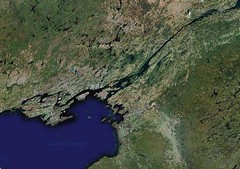
Iteration 5: the North Country- the scattershot placing of the Thousand Islands congregate at the meeting of the Lake and the River, at the same point as the meeting of countries.
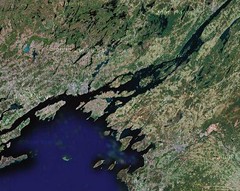
Iteration 6: the Frontier - as the farmland of the I-81 corridor falls away to the southwest, the land grows rugged and filled with massive glacial features and pathworked lakes as it follows the River to the Ocean. Place names become smaller, more disparate, an expanding universe even as our view contracts.
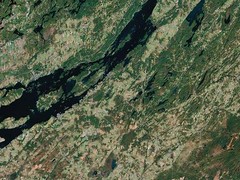
Iteration 7: Indian River valley - as with their larger counterparts, a new River and series of Lakes in the Theresa area take up the banner of crossroads at this new level. The lack of cultivation in the lakes area speaks equally to the changing character of the area as well as the ancient and indomitable forces underlyaing the land. This is a place in which humanity is at best in a fragile coexistence with the place it inhabits. There are no conquerors where survival hangs on a patched and coughing furnace holding back the winter cold.
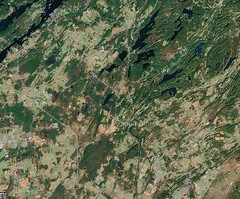
Iteration 8: Theresa - a tiny mill town whose heyday is as past as it was brief. a small settlement perched on a glacial wilderness. And a river runs through it, and connected us all.

Iteration 9: Southwest Theresa - two large areas of wetland surrounding Black Creek and tributaries to the Indian River meet along a narrow strip of rt. 37.
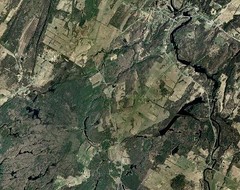
Iteration 10: Douglass Crossings Area - a hamlet, a few old houses stand sentinel around a crossroads, a gateway to the northern frontier for those traveling from Watertown. Completely dwarfed by the wilderness around it.
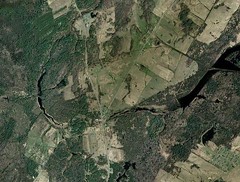
Iteration 11: Douglas Crossings - some houses come into view, and the railroad is more prominent. The thin connecting stream passes between the large swaths of undeveloped land.
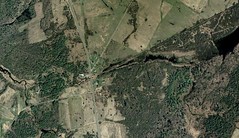
Iteration 12: Douglass Crossings south - the southern side of the small hamlet, a condensed monument to the town's frontier past...an old railroad's path, the remnants of a cheese factory (now making ice) to the NE, and the large stately farm manors built as a futile statement against the vast emptiness of the landscape.
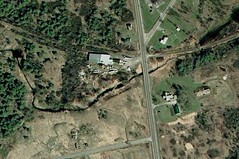
Iteration 13: The Douglass Mansion - a name as overly ambitious in describing the old farmhouse as the farmhouse itself is as an attempt to erect the permanence of civilization against the north country sky. An old Barn ruin speaks to its past, a new garage to the present. Even at this closeness, it is an incomprehensible distance from the psychic landscape of my childhood.

Iteration 14: You Can't Go Home Again - the motif again...at the crossroads of my past and future, at the intersection of the real landscape and the emotional one is a clear sign. You cannot go back, you cannot be where, and more importantly, when, you used to be. You can view it from afar, even while there, but we bear distance as our first child.
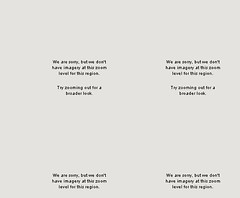
Iteration 15: Me
In our first years, we had a garden. Our parents were ambitious, they put their mark on the land. We dug into the dark fertile earth. I remember the smell...layered and old in the fall, moist and smelling of green growing things in the spring. But always rich. And from that soil grew corn, flowers, tomatoes until life got in the way and we let it go fallow again. I want to dig my way back through the years, to smell the richness of a time and place, to see it bear life again. I can't seem to get deep enough to find that fertile darkness anymore.
At the crossroads New England, at the crossroads of a Great Lake and a great River, at the crossroads of a river valley and the wilderness, at the crossroads of tributaries, at the crossroads of a hamlet, at the crossroads of a town and its past, is my crossroads.
Iteration 1: The East Coast - New York, without borders, is the gateway, in more than just a geographical sense, between New England and the rest of the country.

Iteration 2: New York and southern Canada- The Finger Lakes and the Adirondacks are clearly visible, taking up huge swaths of the state

Iteration 3: Upstate NY - the vast amount of the state that is not in the City, to the continual suprise of the rest of the country. Cities become visible against a background of green and tan agriculture

Iteration 4: Northern New York - bordered by Onondaga to the west, the great St. Lawrence River plain to the north, and the Adirondacks to the east, home was compromise between the extremes around it.

Iteration 5: the North Country- the scattershot placing of the Thousand Islands congregate at the meeting of the Lake and the River, at the same point as the meeting of countries.

Iteration 6: the Frontier - as the farmland of the I-81 corridor falls away to the southwest, the land grows rugged and filled with massive glacial features and pathworked lakes as it follows the River to the Ocean. Place names become smaller, more disparate, an expanding universe even as our view contracts.

Iteration 7: Indian River valley - as with their larger counterparts, a new River and series of Lakes in the Theresa area take up the banner of crossroads at this new level. The lack of cultivation in the lakes area speaks equally to the changing character of the area as well as the ancient and indomitable forces underlyaing the land. This is a place in which humanity is at best in a fragile coexistence with the place it inhabits. There are no conquerors where survival hangs on a patched and coughing furnace holding back the winter cold.

Iteration 8: Theresa - a tiny mill town whose heyday is as past as it was brief. a small settlement perched on a glacial wilderness. And a river runs through it, and connected us all.

Iteration 9: Southwest Theresa - two large areas of wetland surrounding Black Creek and tributaries to the Indian River meet along a narrow strip of rt. 37.

Iteration 10: Douglass Crossings Area - a hamlet, a few old houses stand sentinel around a crossroads, a gateway to the northern frontier for those traveling from Watertown. Completely dwarfed by the wilderness around it.

Iteration 11: Douglas Crossings - some houses come into view, and the railroad is more prominent. The thin connecting stream passes between the large swaths of undeveloped land.

Iteration 12: Douglass Crossings south - the southern side of the small hamlet, a condensed monument to the town's frontier past...an old railroad's path, the remnants of a cheese factory (now making ice) to the NE, and the large stately farm manors built as a futile statement against the vast emptiness of the landscape.

Iteration 13: The Douglass Mansion - a name as overly ambitious in describing the old farmhouse as the farmhouse itself is as an attempt to erect the permanence of civilization against the north country sky. An old Barn ruin speaks to its past, a new garage to the present. Even at this closeness, it is an incomprehensible distance from the psychic landscape of my childhood.

Iteration 14: You Can't Go Home Again - the motif again...at the crossroads of my past and future, at the intersection of the real landscape and the emotional one is a clear sign. You cannot go back, you cannot be where, and more importantly, when, you used to be. You can view it from afar, even while there, but we bear distance as our first child.

Iteration 15: Me
In our first years, we had a garden. Our parents were ambitious, they put their mark on the land. We dug into the dark fertile earth. I remember the smell...layered and old in the fall, moist and smelling of green growing things in the spring. But always rich. And from that soil grew corn, flowers, tomatoes until life got in the way and we let it go fallow again. I want to dig my way back through the years, to smell the richness of a time and place, to see it bear life again. I can't seem to get deep enough to find that fertile darkness anymore.
At the crossroads New England, at the crossroads of a Great Lake and a great River, at the crossroads of a river valley and the wilderness, at the crossroads of tributaries, at the crossroads of a hamlet, at the crossroads of a town and its past, is my crossroads.
Tuesday, December 16, 2008
My take on Paul (o' the Bible)
Let me preface this by saying the following:
I have a fairly limited blog audience. 2, 3 at most. Of that vast throng of 3, at least 2 are deeply faithful Christian fellows whose posts are absolutely fantastic to read even when I don't necessarily agree, or, as is more often the case, have the slightest clue what they're talking about. (Hi Stan and Ben)
More often than not, it's somewhat akin to a quantum physics professor explaining string theory to a 1st grader. Yes, I know what string is. However, I don't think that is a qualifying factor to be in that discussion.I am not a learned fellow when it comes to the bible and the heaps of theological theory and discussion of the last couple millenia. So this post is the opposite, the 1st grader musing on string to the learned professors. Therefore I am on incredibly thin ice in writing this, but there's something that's always made me wonder about Paul...
Paul, or, Jesus's Pen Pal
Paul...so this Paul guy....he never actually meets Alive Jesus, he claims that Jesus appeared to him in a vision on a road trip post-resurrection. He then becomes the Stephen King of the bible, cranking out letters like nobody's business, some suggesting that he usually used a scribe to write most of the stuff down for him. I had to wiki him (see what I meant about biblical study?) to get the right number, but 14 epistles are attributed to him in the bible. 14!! Over half of the New Testament books...by one guy! That seems like an inordinate amount of influence for a single person. For this is compounded by the content; he's not just saying "Jesus did X, Jesus said Y", he's saying "this is what it MEANS/this is what you should DO". Since so much of modern Christian thought seems to derive from his interpretations/inspirations. And given how much of modern society is built around Christian theology, that makes him one of the more influential people in the last couple millenia. What he says makes up more books of the New Testament than the Gospels and actual direct quotes from the big J. Furthermore, scholars dispute (as scholars are apt to do) the authorship of about half of Paul's epistles, some going so far as to suggest that some of the epistles rode in on the coattails of having had Paul's name erroneously attached to them. I'm sure there are Paul fanboys who will take me to task on this. But wow...it just seems weird that the bulk of the books of THE BOOK for a religion are (potentially) authored by one guy interpreting the teachings of another guy he never met while that guy was teaching. factoring in the potential that some of those books may not have even been written by Paul, but slipped in with his name on them, then you have a situation in which you have a goodly number of parts of the Bible written by guys once or twice removed from the guy they're interpreting.
That blows my mind.
Biblical History
I don't write this to cast doubts on anyone's faith, or to try to prove a point, or put forth conspiracy theory. It's just an interesting thing to me, having been raised in a small town church where the teachings were simple, and direct, to really contemplate the history behind the Bible as a document, and the influences it has.
One of the concerns I always had in various journies of faith is the potential for pollution by human hands and human interests. I am certainly not someone of the conspiracy theory mindset that believes possibility = probability= fact. But given that the modern church, with a vastly greater array of societal checks and balances against it, still manages to monumentally flub up now and then (televangelists, catholic altar boy scandals, preachers preaching hate/bigotry/etc,) there's something that doesn't sit right with me in assuming that past church institutions, who racked up abuses in other aspects (no one expects the Spanish Inquisition!) were suddenly pure as the driven snow in terms of maintaining doctrinal integrity. Especially when they had motive and opportunity to nudge things to serve their interests.
I know many would say it was divine providence/guidance/protection, and that whatever made it into the Bible is untainted. I am not saying it is untrue..I am not qualified to make that argument...I'm talking about how it is perceived by folks like me who aren't coming in with the automatic, unquestioned assumpition that the Bible is unimpeachable as the Word o' God. Given the variety of interpretations existing now, and the willingness of different sects to promote their own interpretations, it at least FEELS unlikely (divine intervention notwithstanding) that the Bible made it through the initial years, official formulations, and countless translations of translations by folks with direct reasons to alter it to serve their purposes, without having things nudged here and there.
Paul really stands out to me as an example of the controversey, because, damn, he had a HUGE impact on how the early church got shaped. To me, he's symbolic of this issue with Biblical history (of the book iteself, not history as recounted in the Bible)...it's somewhat murky as to who wrote what, how it got accepted, why other things didn't get accepted, and to how it may have been subtly or not so subtly altered in the mean time.Having been on both sides of the fence, this seems like it's a point that Christians need to really understand when talking about the Bible with those who have doubts...If someone already doesn't have faith, I'm not sure how effective the assumption of the bible being untainted is at selling your point. Essentially, "You should have faith because of the teachings of this Book. And you should have faith in the Book because the book says you should, even if there's the appearance of the potential of impropriety...like one guy who never met Jesus writing (maybe) half the books of the New Testament, and, oh, yeah, the millenia of the human institution of the church potentially having its way with the Book"
That has to be a hard bridge to get someone to cross...to ask them to make a leap of faith not only in belief in a deity, but in belief that the deity's handbook hasn't been influenced by us silly humans who have had opportunity and motive to do so, and who have shown in this person's life that they are as fallible as the rest of us. Essentially a leap of faith that divine intervention occurred in the past, even though it doesn't seem to be occurring in the present. Maybe you guys, Stan and Ben, can comment on how you deal with that issue, how you see it. Like I said, just interesting to me, not a critique of Christian faith. I'm curious how those who evangelize/witness deal with this..
In any case, Paul remains the poster boy of this concpet for me. If any one person embodied the potential for influencing, purposefully or not, how we interpret the original teachings, it's Paul.
I have a fairly limited blog audience. 2, 3 at most. Of that vast throng of 3, at least 2 are deeply faithful Christian fellows whose posts are absolutely fantastic to read even when I don't necessarily agree, or, as is more often the case, have the slightest clue what they're talking about. (Hi Stan and Ben)
More often than not, it's somewhat akin to a quantum physics professor explaining string theory to a 1st grader. Yes, I know what string is. However, I don't think that is a qualifying factor to be in that discussion.I am not a learned fellow when it comes to the bible and the heaps of theological theory and discussion of the last couple millenia. So this post is the opposite, the 1st grader musing on string to the learned professors. Therefore I am on incredibly thin ice in writing this, but there's something that's always made me wonder about Paul...
Paul, or, Jesus's Pen Pal
Paul...so this Paul guy....he never actually meets Alive Jesus, he claims that Jesus appeared to him in a vision on a road trip post-resurrection. He then becomes the Stephen King of the bible, cranking out letters like nobody's business, some suggesting that he usually used a scribe to write most of the stuff down for him. I had to wiki him (see what I meant about biblical study?) to get the right number, but 14 epistles are attributed to him in the bible. 14!! Over half of the New Testament books...by one guy! That seems like an inordinate amount of influence for a single person. For this is compounded by the content; he's not just saying "Jesus did X, Jesus said Y", he's saying "this is what it MEANS/this is what you should DO". Since so much of modern Christian thought seems to derive from his interpretations/inspirations. And given how much of modern society is built around Christian theology, that makes him one of the more influential people in the last couple millenia. What he says makes up more books of the New Testament than the Gospels and actual direct quotes from the big J. Furthermore, scholars dispute (as scholars are apt to do) the authorship of about half of Paul's epistles, some going so far as to suggest that some of the epistles rode in on the coattails of having had Paul's name erroneously attached to them. I'm sure there are Paul fanboys who will take me to task on this. But wow...it just seems weird that the bulk of the books of THE BOOK for a religion are (potentially) authored by one guy interpreting the teachings of another guy he never met while that guy was teaching. factoring in the potential that some of those books may not have even been written by Paul, but slipped in with his name on them, then you have a situation in which you have a goodly number of parts of the Bible written by guys once or twice removed from the guy they're interpreting.
That blows my mind.
Biblical History
I don't write this to cast doubts on anyone's faith, or to try to prove a point, or put forth conspiracy theory. It's just an interesting thing to me, having been raised in a small town church where the teachings were simple, and direct, to really contemplate the history behind the Bible as a document, and the influences it has.
One of the concerns I always had in various journies of faith is the potential for pollution by human hands and human interests. I am certainly not someone of the conspiracy theory mindset that believes possibility = probability= fact. But given that the modern church, with a vastly greater array of societal checks and balances against it, still manages to monumentally flub up now and then (televangelists, catholic altar boy scandals, preachers preaching hate/bigotry/etc,) there's something that doesn't sit right with me in assuming that past church institutions, who racked up abuses in other aspects (no one expects the Spanish Inquisition!) were suddenly pure as the driven snow in terms of maintaining doctrinal integrity. Especially when they had motive and opportunity to nudge things to serve their interests.
I know many would say it was divine providence/guidance/protection, and that whatever made it into the Bible is untainted. I am not saying it is untrue..I am not qualified to make that argument...I'm talking about how it is perceived by folks like me who aren't coming in with the automatic, unquestioned assumpition that the Bible is unimpeachable as the Word o' God. Given the variety of interpretations existing now, and the willingness of different sects to promote their own interpretations, it at least FEELS unlikely (divine intervention notwithstanding) that the Bible made it through the initial years, official formulations, and countless translations of translations by folks with direct reasons to alter it to serve their purposes, without having things nudged here and there.
Paul really stands out to me as an example of the controversey, because, damn, he had a HUGE impact on how the early church got shaped. To me, he's symbolic of this issue with Biblical history (of the book iteself, not history as recounted in the Bible)...it's somewhat murky as to who wrote what, how it got accepted, why other things didn't get accepted, and to how it may have been subtly or not so subtly altered in the mean time.Having been on both sides of the fence, this seems like it's a point that Christians need to really understand when talking about the Bible with those who have doubts...If someone already doesn't have faith, I'm not sure how effective the assumption of the bible being untainted is at selling your point. Essentially, "You should have faith because of the teachings of this Book. And you should have faith in the Book because the book says you should, even if there's the appearance of the potential of impropriety...like one guy who never met Jesus writing (maybe) half the books of the New Testament, and, oh, yeah, the millenia of the human institution of the church potentially having its way with the Book"
That has to be a hard bridge to get someone to cross...to ask them to make a leap of faith not only in belief in a deity, but in belief that the deity's handbook hasn't been influenced by us silly humans who have had opportunity and motive to do so, and who have shown in this person's life that they are as fallible as the rest of us. Essentially a leap of faith that divine intervention occurred in the past, even though it doesn't seem to be occurring in the present. Maybe you guys, Stan and Ben, can comment on how you deal with that issue, how you see it. Like I said, just interesting to me, not a critique of Christian faith. I'm curious how those who evangelize/witness deal with this..
In any case, Paul remains the poster boy of this concpet for me. If any one person embodied the potential for influencing, purposefully or not, how we interpret the original teachings, it's Paul.
Tuesday, December 9, 2008
Brazos Bend State Park - 12/6/08 Photoshoot
Took a stroll through my favorite Texas park with a group of photographers on Saturday. The focus was landscapes, and the light and time couldn't have been better. The fields and swamps were bathed in a rich glow, and the final sunset shifted color palettes by the minute. I couldn't fire away fast enough.
Here's a couple shot.
Go to www.flickr.com/photos/jmbower for the full shoot.
Sunset over 40-Acre Lake barrier island

Tree with Venus

Black Birds over Golden Fields
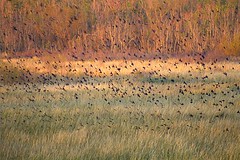
Last Light on Spanish Moss

Last Leaf of the Season

Afternoon Glow

Here's a couple shot.
Go to www.flickr.com/photos/jmbower for the full shoot.
Sunset over 40-Acre Lake barrier island

Tree with Venus

Black Birds over Golden Fields

Last Light on Spanish Moss

Last Leaf of the Season

Afternoon Glow

Monday, December 8, 2008
9 trombones a-playing
Christmas in Houston.... Zero snow, overtly conspicuous consumption of a money soaked town, and a general level of stress (I am the worst person at gifts, ever. Like, running shoes for Steven Hawking bad.)do not a cheerful Justin make.
So I was out shopping yesterday. I dislike shopping. I cannot emphasize enough how much "dislike" in that context is grossly underestimating my disdain for the sake of politeness. I had spent a grueling 45 minutes...(I'll pause to let the ladies, parents and more commerce oriented gentleman stop laughing uncontrollably..)..shopping at the frou frou shopping "destination" near us. (Imagine a strip mall that struck oil, packed up the family in a rickety old car, and moved to Bev-er-ly. The epitome of Houston) I finally made it to the semi-acceptable safe haven of Barnes and Noble.
As I opened the door, the ubiquitous Christmas music sounded different...warmer, fuller..somehow... As I stalked through the racks, I suddenly came in to a cleared area, face to face with....
9 trombones. Held by 9 trombonists. Playing Christmas music. (Quite handily.)
The surreality of it took me aback at first, but having been a trombone player in my formative years, I took a seat. I listened. There was no explanation, just a row or tw0 of chairs, and 9 trombonists belting out some beautifully warm brass music.
I couldn't help but smile. And relax.
The rest of the trip was a swirl of harsh lights, frenetic motion and price tags. But that five or ten minutes of 9 random trombones completely made my day. There were old trombonists, young trombonists, men, women, tall, short, round, thin, etc. It was a trombonic spectacle.
I don't even know why...maybe just passing sentimentality...a familiarity of sound, maybe just that the trombonists, while quite capable, weren't dressed or appointed as puffed up professionals. It looked like a community band, or just a group of random trombonists who had miraculously met and decided to hold an impropmtu concert. It was a little piece of home and past and I thank them for it.
I have a sneaking suspicion that if you massed enough trombonists in any one place, you'd be well on your way to solving something.
So I was out shopping yesterday. I dislike shopping. I cannot emphasize enough how much "dislike" in that context is grossly underestimating my disdain for the sake of politeness. I had spent a grueling 45 minutes...(I'll pause to let the ladies, parents and more commerce oriented gentleman stop laughing uncontrollably..)..shopping at the frou frou shopping "destination" near us. (Imagine a strip mall that struck oil, packed up the family in a rickety old car, and moved to Bev-er-ly. The epitome of Houston) I finally made it to the semi-acceptable safe haven of Barnes and Noble.
As I opened the door, the ubiquitous Christmas music sounded different...warmer, fuller..somehow... As I stalked through the racks, I suddenly came in to a cleared area, face to face with....
9 trombones. Held by 9 trombonists. Playing Christmas music. (Quite handily.)
The surreality of it took me aback at first, but having been a trombone player in my formative years, I took a seat. I listened. There was no explanation, just a row or tw0 of chairs, and 9 trombonists belting out some beautifully warm brass music.
I couldn't help but smile. And relax.
The rest of the trip was a swirl of harsh lights, frenetic motion and price tags. But that five or ten minutes of 9 random trombones completely made my day. There were old trombonists, young trombonists, men, women, tall, short, round, thin, etc. It was a trombonic spectacle.
I don't even know why...maybe just passing sentimentality...a familiarity of sound, maybe just that the trombonists, while quite capable, weren't dressed or appointed as puffed up professionals. It looked like a community band, or just a group of random trombonists who had miraculously met and decided to hold an impropmtu concert. It was a little piece of home and past and I thank them for it.
I have a sneaking suspicion that if you massed enough trombonists in any one place, you'd be well on your way to solving something.
Subscribe to:
Comments (Atom)
